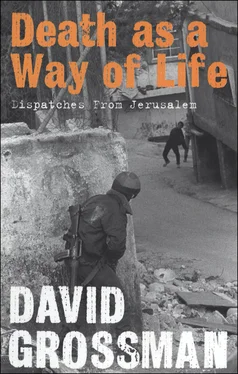David Grossman - Death as a Way of Life
Здесь есть возможность читать онлайн «David Grossman - Death as a Way of Life» весь текст электронной книги совершенно бесплатно (целиком полную версию без сокращений). В некоторых случаях можно слушать аудио, скачать через торрент в формате fb2 и присутствует краткое содержание. Год выпуска: 2013, Издательство: Bloomsbury Publishing, Жанр: Прочая документальная литература, на английском языке. Описание произведения, (предисловие) а так же отзывы посетителей доступны на портале библиотеки ЛибКат.
- Название:Death as a Way of Life
- Автор:
- Издательство:Bloomsbury Publishing
- Жанр:
- Год:2013
- ISBN:нет данных
- Рейтинг книги:5 / 5. Голосов: 1
-
Избранное:Добавить в избранное
- Отзывы:
-
Ваша оценка:
- 100
- 1
- 2
- 3
- 4
- 5
Death as a Way of Life: краткое содержание, описание и аннотация
Предлагаем к чтению аннотацию, описание, краткое содержание или предисловие (зависит от того, что написал сам автор книги «Death as a Way of Life»). Если вы не нашли необходимую информацию о книге — напишите в комментариях, мы постараемся отыскать её.
Death as a Way of Life — читать онлайн бесплатно полную книгу (весь текст) целиком
Ниже представлен текст книги, разбитый по страницам. Система сохранения места последней прочитанной страницы, позволяет с удобством читать онлайн бесплатно книгу «Death as a Way of Life», без необходимости каждый раз заново искать на чём Вы остановились. Поставьте закладку, и сможете в любой момент перейти на страницу, на которой закончили чтение.
Интервал:
Закладка:
Two coordinated suicide bombings on July 30, 1997, in the Jerusalem Mahaneh Yehuda market, left sixteen people dead and 180 wounded. Five weeks later, central Jerusalem was hit again with another major terrorist attack carried out by three Hamas suicide bombers. On October 1, 1997, Israel acceded to pressure from Jordan and released the spiritual leader of Hamas, Sheikh Ahmed Yassin.
Two explosions that slayed so many Israelis and wounded nearly two hundred have also punctured the strange bubble in which Israelis have been floating this past year.
Despair and paralysis pervaded the bubble, as did, in particular, a desire not to know what is really happening. In the period since Benjamin Netanyahu came to power, it seemed as if no one in Israel truly understood the reality that the prime minister was creating with his sleights of hand, and the consequences of that reality. The situation has repeatedly reached the brink of explosion, yet each time, at the last minute, the peace process has been rescued. Not in order to surge forward toward realization, but rather again to tread water.
The explosions in Jerusalem’s central open-air market woke all of us up from the absurd illusion that things could stay as they are indefinitely. The explosions also proved the irrelevance of Netanyahu’s campaign slogan “Making a secure peace,” and showed that without peace there is also no security.
True, under the Rabin and Peres governments there were also mass murders of innocent Israelis by Palestinian suicide bombers, but then, at least, it was clear that a genuine peace would gradually reduce the number and power of those who support such acts. Today it is hard to speak of the Palestinians having any hope. The majority of Israelis do not realize the depth of Palestinian despair and humiliation caused by Israeli government policies. Under these circumstances, it is now clear, Israeli lives will be as intolerable as Palestinian lives.
The two peoples have not learned anything. Israel condemns the use of force and terror, but itself exerts the full force of its political, economic, and military might to suffocate the Palestinians in the occupied territories and to extinguish any glimmer of hope they may have. Arafat, in his distress, but also as a result of his own cynical calculations, is not prepared to withdraw his own cards of force and violence. He has taken great care not to make any serious effort to fight terrorism and Hamas’s supporters (only two weeks ago, senior Palestinian officers and policemen from the Palestinian Authority were caught on their way to committing a terrorist attack in Israel). Each time he speaks publicly, he takes care to leave the option of war open.
On the face of it, one might have thought that in such a savage region, only the language of violence could ensure political gain. But that, too, is an illusion that we should have long ago abandoned. Violence justifies more violence and makes pursuers of peace despair all the more.
Today is especially bitter and depressing, because only four years ago we could envision how despicable acts such as this explosion might be gradually relegated to the past. We almost realized a dream, but it has evaporated. Again we are caught up in the spiral of violence we were born into. We want peace, but it seems that many, among both peoples, are still not ripe for it. The pessimists in Israel like to say that only another round of violence will make the two sides come to their senses, but now even that seems optimistic fantasy. Another war will only make the positions of each side more extreme, and will drag more people into the cycle of hatred and revenge.
The dead lie before us, innocent dead, pawns in the hands of incompetent and cynical leaders. It seems that this last explosion requires us to look at reality as it is. Israelis and Palestinians cannot on their own reach an agreement that will ensure true peace. They are hostages of their history and psychology, and have lost their ability to save themselves. If there are still other countries that care about what is happening in this corner of the world, they should take action to force the leaders on both sides to begin talking seriously. The American tactic of “letting the sides stew in their own juices” is not effective. Neither is European caution called for. We now need determined pressure on both sides, especially on Israel, which holds most of the cards. Pressure that will take account of the justified fears of the two peoples and of their actual needs. Pressure that may just save the Israelis and the Palestinians from themselves.
Whose Life Is It, Anyway?
September 1998
This article was written on the eve of the coming Jewish New Year.
This week, with the Jewish year drawing to a close, is a time for making personal and communal assessments. A seemingly strange question came to me in this context: Are there any Israelis today who feel that they are living the life they would like to live?
Also, how has it happened that the Israeli reality is, more than anything else, a depressing sequence of compromises and anxieties and apathy and fatalism?
And the government, the one elected by the majority — who, actually, does it represent today?
In other words, would Israelis today, even a handful, on the left or on the right, give their votes to any leader whose platform promised voters the current state of affairs?
“We’ve got a wonderful country,” Prime Minister Benjamin Netanyahu thunders at every opportunity. He’s right — we really do have a wonderful country, but why does it seem like a dream that is steadily fading? And why does almost every large sector of the population — the religious, the secular, the settlers, the members of Peace Now, the Russians, the Ethiopians, the ultraorthodox, the unemployed, the Israeli Arabs — see itself as a persecuted minority, living under a hostile regime? And why do so many Israelis feel that an ever-expanding abyss of alienation stretches between them and their own country?
Apparently, there’s something mesmerizing about that abyss. It’s a fact: nearly 6 million people are being sucked into it without protesting much, without frequent, huge demonstrations, without vigils at every street corner. There are no individual hunger strikes, or any other legitimate act of civil disobedience. There’s not even a single television satire worthy of the name.
But the sense that something has passed us by doesn’t let go, the feeling that something precious and rare is slipping through our fingers, irrevocably. Perhaps, for that reason, Israelis are becoming more bitter and resentful by the year, displaying a specific kind of hostility toward one another, like that of prisoners sharing a cell, like partners in a failing business.
How little sympathy and understanding we have, even for other Israelis who don’t belong to our own group. With what rage, or derision, we relate to the real, authentic pain of Israelis who are not “us.” As if our automatic and long-standing refusal to recognize at least some of the Palestinian claims, lest any of the justice of our own cause be appropriated from us, has seeped into our most inner selves and set entirely awry our common sense and natural family instincts. At times it seems as if what Jews do to other Jews in this country would be defined in any other country as nothing less than antisemitism.
Those who return to Israel after a long absence are generally amazed by the tremendous development of the cities, the roads, and the malls, but are taken aback by the people themselves — the brutality, the vulgarity, and the insensitivity. Those who live here have long since ceased being surprised by this. Within an astoundingly short time our young, friendly, bold country has undergone mental processes of accelerated aging. With a peculiar enthusiasm, Israel has taken on a manner that is rigid, suspicious, dejected, and, more than anything else, lacking confidence in its ability to change, to be re-created into a better tomorrow.
Читать дальшеИнтервал:
Закладка:
Похожие книги на «Death as a Way of Life»
Представляем Вашему вниманию похожие книги на «Death as a Way of Life» списком для выбора. Мы отобрали схожую по названию и смыслу литературу в надежде предоставить читателям больше вариантов отыскать новые, интересные, ещё непрочитанные произведения.
Обсуждение, отзывы о книге «Death as a Way of Life» и просто собственные мнения читателей. Оставьте ваши комментарии, напишите, что Вы думаете о произведении, его смысле или главных героях. Укажите что конкретно понравилось, а что нет, и почему Вы так считаете.












